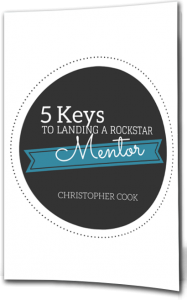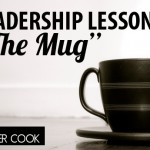Last week, I wrote about three personality types that will totally undo your potential. On the other side of the coin, however, I’m equally passionate about helping people ensure that they don’t ever cap-off their potential. One surefire method to do that is by continually, intentionally learning and growing. And in my opinion, one of the best ways to accomplish this is through mentoring, which is experience-based wisdom passed-on to others in the context of a meaningful relationship.
You Need a Mentor
No matter your age or stage of life, you need a mentor. No matter how good you are in a particular area of life, there’s someone better than you. And no matter how significant or seemingly insignificant your area of interest, your skill set hasn’t peaked. Why? Because as I’ve stated several times before, we don’t know what we don’t know, and in that is an opportunity to grow.
Last week, a good friend—an entrepreneur himself—sent me the following message: “You know, one suggestion I repeatedly read in business-related articles and blogs is ‘get a mentor…get a mentor’ but every time I think of someone in my life who is further along in business than I am, I always struggle with how I could connect with them and learn from them long-term…so if you ever write an article about how to get the most out of a mentor relationship, I’ll be the first in line to read it.”
Well, my friend, here it is.
Coincidentally, I had three similar conversations this past week about mentoring and coaching. Through them, I realized that the people with whom I spoke possessed an insatiable desire for self-improvement—not to rack a résumé full of stats and highlights, but to have a deep well of knowledge and experience from which to draw so that they would truly make a “dent” with their life, maximize their skills, achieve their goals, and aspire to cause growth in others. You see, it’s all about impact and influence through compounded experience-based wisdom. And the key to a successful mentoring relationship, as my good friend alluded to in his text message, begins with connection.
The Linchpin of Successful Mentoring: Connection
I have heard it said, “people don’t care what you know until they know how much you care.” It is for that reason that I believe true connection is far greater than exchanging information with someone; it’s connecting with their heart. As such, I believe that heart-connection (where personal validation, authenticity, and meaningful value-add is present) is the purest distillation of the significance of mentoring. To that, connection at its core thrives upon excellent listening skills, because until you actively listen, you do not truly know how another person thinks and feels about a given situation.
Mentoring Starts by Leading from the Heart
For me, what it comes down to is this: to lead yourself, you can get away with using your head. But to lead others in an effective mentoring relationship, you must use your heart.
Totally unlike college.
I loved college, especially early morning lectures. But I didn’t love the lectures that were “taught” by men and women who simply stood before the class and read the 15-year-old text aloud in fragmented English (sorry, but it’s true). They were communicating, but they definitely were not connecting with any of us students. In my senior year, though, I had a rockstar capstone advertising professor. He was adjunct but served as the chief marketing officer for a large Seattle-based company as his main career. He lived, breathed, and bled product, placement, pricing, and promotion. And as a result…
I was hooked like a fourth grader on Nintendo.
I couldn’t get enough of his passion, focus, and inspiration. Not only did his passion rub-off on me (I love marketing strategy), I 4.0’d the class and designed, as he said, “one of the most dazzling ad campaigns he had ever seen.”
Was my campaign Super Bowl worthy? Who knows? But I attribute my honed passion and subsequent success to his inspiring method of teaching both in and out of the classroom.
That’s the power of mentoring.
If you’re serious about ramping-up your potential by engaging in a mentoring relationship, here are several bulletproof strategies to finding a great mentor, positioning yourself as a great mentee, learning long-term, and most importantly, being a great mentor to someone else.
Buckle-up.
I’ve Been Looking for YOU: Finding a Rockstar Mentor
- The first step in looking for a mentor is to find someone who’s better than you in the particular area of mentoring you’re seeking. It’s that simple. Seek someone who is wiser than you, who earns more money than you, who has more refined skills than you, and whose character is more developed than yours. If you don’t know anyone like that in your immediate circle of influence, get a new circle. You may be the smartest in the class, but that simply means that you’ve hit a plateau in your growth. Do some research, send e-mails, make a few phone calls, but don’t stop until you find a great mentor.
- Don’t rely on one mentor for every area of your life. If you’re looking to improve in your leadership, find the best leader. If you’re looking to improve your health, find the healthiest, most knowledgeable person you can find. If you’re looking to improve your relationships, find someone who is extremely successful in relationships. My point is that what you learn is as important as who you learn from.
- Look for a mentor who is an excellent listener. To that, be an active listener. This is huge: record your meetings and take notes later. Focus on your mentor’s heart and take note of their non-verbal communication cues. In doing so, you’ll discover what really matters most to them.
- Seek an authentic person who will teach and inspire from the heart (from a place of authenticity and experience), not simply from theory and intellect.
- Once you find a mentor, make a list of questions but don’t be locked into them. Why? In conversation, your mentor may say something that will trigger a better question than the one you originally formulated.
The Attractive Mentee: Position Yourself to Learn from the Best
- Remain a novice. Stay massively hungry. Stay teachable.
- Become a better listener.
- Be willing to pay a price for mentoring. People place value upon that which costs the most.
- Prioritize mentoring in your regular schedule. What doesn’t get scheduled rarely gets done.
- How badly do you want it? Will you do what others did so you can do what they do? What price are you willing to pay?
- Develop a regimented plan of implementation. Great thoughts on paper stay on paper. Great thoughts turned into action yield a bettered life.
- Look for someone to pass your newly acquired skills and knowledge onto.
Which leads me to this—reproduction—building someone else for significance:
After Being Mentored, Mentor
- Teach from points of percolation. Don’t set the agenda for your mentee. Teach them out of their own life experiences.
- Learn to connect. As I’ve already stated, doing so starts with great listening. And in order to effectively communicate with a person, you have to understand them as a person.
- Just as it is when you’re the mentee, practice active listening. By listening well, you’ll ask better questions.
- Don’t hide your scars. It’s unnecessary to flaunt your failures as a martyr, but it’s foolish to pretend they don’t exist. I firmly believe that moments of “suck” are really healthy for a grounded perspective on personal growth. Adding to this thought in a manner like only he can, John Maxwell says, “If you want to impress people, talk about your successes. If you want to impact people, talk about your failures.”
- Look for someone with high capacity. In life, we judge ourselves by intentions, yet we are judged by performance. The job of a mentor is to close the gap between intention and performance. Who in your life is eager to be expanded, trained, and empowered? Who is open to affirmation and correction?
- Find out who your mentee influences. This may sound harsh, but don’t pour into someone who won’t pour into others. I’m serious. It’s a waste of your time. Ask your prospective mentee, “Before I invest my life into yours, whose life will you pour yourself into?”
- What you say is important, but how you say what you say is of greater importance. Does your non-verbal communication complement the words that come out of your mouth?
Mentoring has changed my life. Presently, I have five people in whom I’ve entrusted my dreams and passions, skill development, and character growth. Without them, I’d be stuck with a bunch of theory without practice and conjecture without experience.
I’m certainly not where I want to be, but my dedication to daily growth has added exponentially more to my life than if I had not sought out mentors.
So…entrepreneurs, musicians, artists, teachers, pastors, athletes, caregivers, and business people…
It’s your turn! Go get a mentor!
 [bluebox]FREE BONUS: Because I want you to have the right tools to find the right mentor, I want to give you my NEW guide, “5 Keys to Landing a Rockstar Mentor.” Simply click on the download button below and watch your email inbox for the free guide! *Note: if you’re a current subscriber, you’ve already received this bonus.[/bluebox]
[bluebox]FREE BONUS: Because I want you to have the right tools to find the right mentor, I want to give you my NEW guide, “5 Keys to Landing a Rockstar Mentor.” Simply click on the download button below and watch your email inbox for the free guide! *Note: if you’re a current subscriber, you’ve already received this bonus.[/bluebox]




